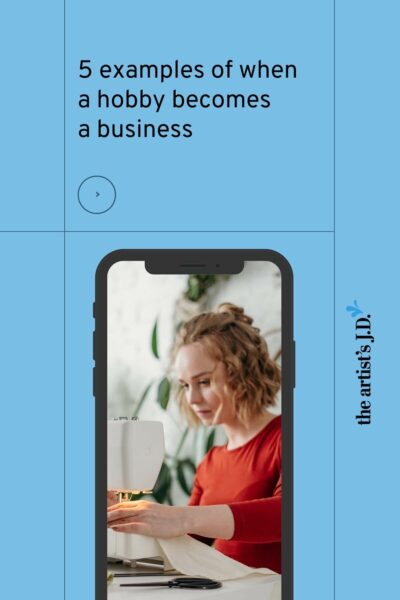At what point does a hobby turn into a business?
Here is the exact question you need to answer to make a decision
Do you have an Etsy shop, podcast, or another creative side project?
Congrats!
These kinds of projects can be a great way to express your creativity and make a little income.
But depending on if your side gig is a hobby or a business there also is an important difference between these kinds of projects legally (and come tax time).
For example, a few years back, my mom got a longarm quilting machine. And ever since she’s been making at least a quilt a month. (And she’s helped me finish three quilts.)
A few months after she got her longarm, she got enough confidence to do a quilt top that her quilting friend created.
After she had finished her friend’s quilt (and agreed to do another one for her), she asked me,
Do I have to invest in getting permits, licenses, or other things if I’m not making a profit?
I get this question a ton from those that have a hobby and then start to generate a little bit of income from it.
And by the end of this post, you’ll know if your thing is a hobby or a business according to the law, and more importantly, the IRS.
The hobby vs business test
The good news is there’s no right or wrong answer to this test. (And you can change your answer as time goes on.)

But you need to know your answer because it impacts you come tax time.
On your personal taxes, you are required to
- report all income for your hobbies
- report all income for your business
But only businesses are allowed to deduct the expenses that were necessary to earn the income.
The IRS test
The official IRS hobby or business test is more complex than the test that I use, but they both boil down to the same exact thing:
Do you hope to make a profit?
The IRS test asks you to consider nine things:
- Is the activity carried out in a businesslike manner and are you keeping complete and accurate books and records?
- What time and effort are you putting into the activity?
- Do you depend on the activity income?
- Are the losses expected based on the stage you are at in your business?
- Are you changing how you are running your business to make it more profitable?
- Do you have the knowledge necessary to run a successful business?
- Have you made a profit doing similar things in the past?
- Have you made a profit in some years? How much?
- Can you expect to make a profit in the future based on your current assets?
Like most IRS tests, this isn’t a test that you add up the results and if you get a certain percentage, you have a hobby or a business. You have to look at it holistically.
My simplified test
This is why the question I use boils the IRS test down to the heart of things,
What do you want? To make a profit or to occasionally cover the cost of your supplies?
The reason I like this question is that the IRS test really boils down to intent. Your intent determines if you have a hobby or a business.
Your intent impacts your:
- recordkeeping requirements
- taxes (FYI: hobby expenses are no longer tax-deductible)
- expectations when it comes to the legal side of things (like permits and licenses)
Your intent is all that matters in the eyes of the law and the IRS.
- If you intend to occasionally cover the cost of your supplies, you have a hobby. And hobbies don’t have legal or tax requirements.
- If you intend to make a profit, then you are running a business in the eyes of the law and the IRS. And you are expected to treat it like a business. (And do all of those things that are expected of businesses.)
Of course, if you intend to make a profit, that doesn’t mean you need to go hog wild. You shouldn’t get yourself in a bunch of debt or spend money willy-nilly.
But you do need to tackle those things that will help you prove to the IRS that you are running a business. And in turn, deduct your expenses (or your business loss) on your tax return.
These things include:
- creating a simple business plan
- picking the right business type
- getting the required permits and licenses
- picking a business name that won’t land you in legal hot water
Did you decide that your creative side project is a business?

Pick up a copy of my book The Legal Roadmap for your Creative Business and get a straightforward strategy to get your legal ducks in a row for just $20. (And without all the confusing legal jargon)

5 examples of when a hobby becomes a business
In the artist’s Courtyard, my legal library and membership community, we have seven Creative Business Guides. And each of our Creative Business Guides runs into the same problems you do. So I use them to highlight how you might handle deciding if your creative side project is a hobby or a business. (Click here to learn more about membership!)
And lucky for you, some of our Creative Business Guides are wondering if they are running a hobby or business. So I’m breaking down below if their hobbies are actually businesses to spark inspiration for your own decision.
What about my Etsy shop?
Molly crochets hats and scarves one or two nights a week to put in her Etsy shop. She has no more than a dozen listings at a time and makes one or two sales a month earning about $1000 a year. She uses this income for fun things, patterns, yarn, or other splurge items.

Molly doesn’t do any marketing or social media for her Etsy shop, just occasionally posts on her personal page when she finishes a new item. She isn’t interested in learning about Etsy SEO or advertising, she just wants to crochet while watching TV and not be the crazy lady with hundreds of hats and scarves.
Verdict: Molly’s Etsy shop is likely a hobby.
Because Molly isn’t putting in much time or effort to make her hobby profitable (or learning the skills required to make it profitable), she has a hobby. She also isn’t reliant on the income and uses it for things she wants, rather than for improvements to her Etsy shop. Because of that, this kind of Etsy shop is a hobby.
This also means Molly needs to report the gross income from Etsy on her taxes each year without any deductions. This means she cannot deduct Etsy listing fees, Etsy credit card processing fees, shipping supplies, postage, or other costs that go along with getting her items to purchasers.
What about my workshop teaching?

Thomas is a talented quilter and also teaches quilting classes. Before the pandemic, he regularly taught 3-4 times a year at local guilds and quilt shops. Since the pandemic, Thomas has started to teach online and has invested in equipment and knowledge on how to successfully fill his online courses.
He has created a website and social media accounts and spends several hours a week updating both to promote his upcoming events and plan new ones.
Thomas loves his day job and doesn’t plan on quitting, instead Thomas’ goal is to earn about $6,000 a year and use this money to help fund his retirement.
Verdict: Thomas’ workshop teaching is likely a business.
Even though Thomas won’t be relying on the income from his workshop teaching for his livelihood, he likely has a business. Since he has invested in equipment and knowledge on how to grow his online courses. He is taking the time to learn what’s necessary to make his online teaching profitable and grow, and that makes him a business.
Because Thomas is a business, he is able to deduct his business expenses on his taxes, including his web hosting costs, credit card processing fees, any equipment he buys, and any courses or workshops he takes to improve his skills.
What about my photography side hustle?

Frank has a portrait photography side hustle. He mostly does portraits in the fall for co-workers and friends for them to use on their holiday cards. But he does occasional sessions the rest of the year.
He has researched what other local photographers charge for these kinds of sessions because he feels like if he’s taking time away from his family, he needs to make it worth it financially. And uses the money he earns to pay for family outings and vacations they otherwise wouldn’t be able to afford.
To make it easier for those he works with, over the past year, Frank created a simple Square booking site. This allows him to collect payment via debit or credit card and simplifies the booking process.
This past fall he also sent emails to family, friends, and co-workers sharing his new Square booking site and asking them to share it with those that might be interested.
Verdict: Frank’s portrait photography side hustle is likely a business.
Even though Frank uses the income for fun family outings, he likely has a business. He has taken the time to competitively price his services, made improvements to make it easier for clients to book him, and is marketing his services to a wide audience. And like Thomas, Frank will be able to deduct his expenses from his income on his tax return.
What about my podcast?

Ezra has a podcast where he shares stories about how learning to knit has impacted his life. Ezra doesn’t accept free products or patterns from knitting companies and doesn’t have any ads or sponsored content. And his only goal for this is to share his journey and a newfound love of knitting.
Ezra does have a Patreon account where podcast listeners can sign up to support his show, and his only level is $5/month which he picked because he hoped he’d get a few signups to cover some of the hosting costs.
Verdict: Ezra’s podcast is likely a hobby.
Since Ezra isn’t accepting any free items, he doesn’t have ads, and his goal for his Patreon is only to help cover his hosting cost he likely has a hobby. And like Molly, he will have to report the gross income from Patreon without any deductions.
Note: Once Ezra starts accepting free items, starts putting ads in his podcast, or changes his intent for the podcast, it likely becomes a business.
What about selling KDP books?

Jillian dreams of starting a creative business but she financially can’t afford to leave her day job until she pays off her debt. She recently learned about selling low-content books on Amazon and has fallen in love with the idea. Since it allows her to express her creativity and can be done on her own schedule.
Jillian now spends most of her free time learning how to create and market KDP books. She’s kept her costs low, just buying a Canva subscription and a few tools, and while she’s published a few books, she hasn’t yet made a sale.
Jillian’s goal is to sell enough books to pay off her debts and then save up so that she can leave her day job and launch her business.
Verdict: Jillian’s KDP low-content bookselling is likely a business.
Even though Jillian hasn’t made a sale, she is spending a significant amount of time learning about how the KDP low-content book-selling model works. And she’s making the investments she thinks are necessary to make the business grow.
It’s true that Jillian’s day job covers her expenses, but she’s taking the steps necessary to make her creative project profitable so that she can make changes to her life. So like Thomas and Frank, she’ll be able to deduct the necessary expenses she has against her income.
When to register your hobby as a business
When it comes to the “hobby or business test”, it’s not about how many of the nine items on the IRS test you answer yes or no to.
Instead, it’s about what is your intent.
- If you are taking actions that show you hope to make a profit, you probably have a business.
- If you aren’t taking actions that show you hope to make a profit, you probably have a hobby.
Your action item:
Answer the following question:
“What do you want? To make a profit or to occasionally cover the cost of your supplies?”
- If you want to cover the cost of your supplies, then in the eyes of the law, you have a hobby, not a business. And hobbies don’t have legal or tax requirements! Please close this window and go create. And come back if things change.
- If you want to make a profit, then you have a business in the eyes of the law and the IRS. This comes with certain benefits but also requirements and expectations and it’s time to register your hobby as a business.
Want my step-by-step guidance to knocking out the requirements and expectations of a business?

That’s exactly what we cover in Map #2 of the Legal Roadmap. It guides you through getting enough legal stuff done to keep your business out of legal hot water. You can pick up your copy using the Amazon link below.
(If you use the above Amazon affiliate link, I’ll make a small commission, but it doesn’t change the price you pay.)

Hi! I’m Kiff! I’m your friendly legal eagle (and licensed attorney).
My goal is to add ease to the legalese. And because I think basic legal resources should be available to every creative, I create a lot of free content.
If I’ve created something that has helped inject a little ease into your creative business and you would like to say “thank you”, you can make a contribution here.
If you’d like to hear more from me, I’d love to pop into your inbox every Friday morning to share additional ways to cut through the red tape and inject a little ease.
Get tips from your friendly legal eagle in your inbox…
Your privacy is important to us. Learn how we protect it here.
Do you still have questions?
No shame in that! One of the perks of membership in the artist’s Courtyard is a 24/7 private online community to ask your questions and get my answer (and insights from other creatives). Already a member? Ask your question! Not a member yet? Join us inside the artist’s Courtyard for $45/month!

